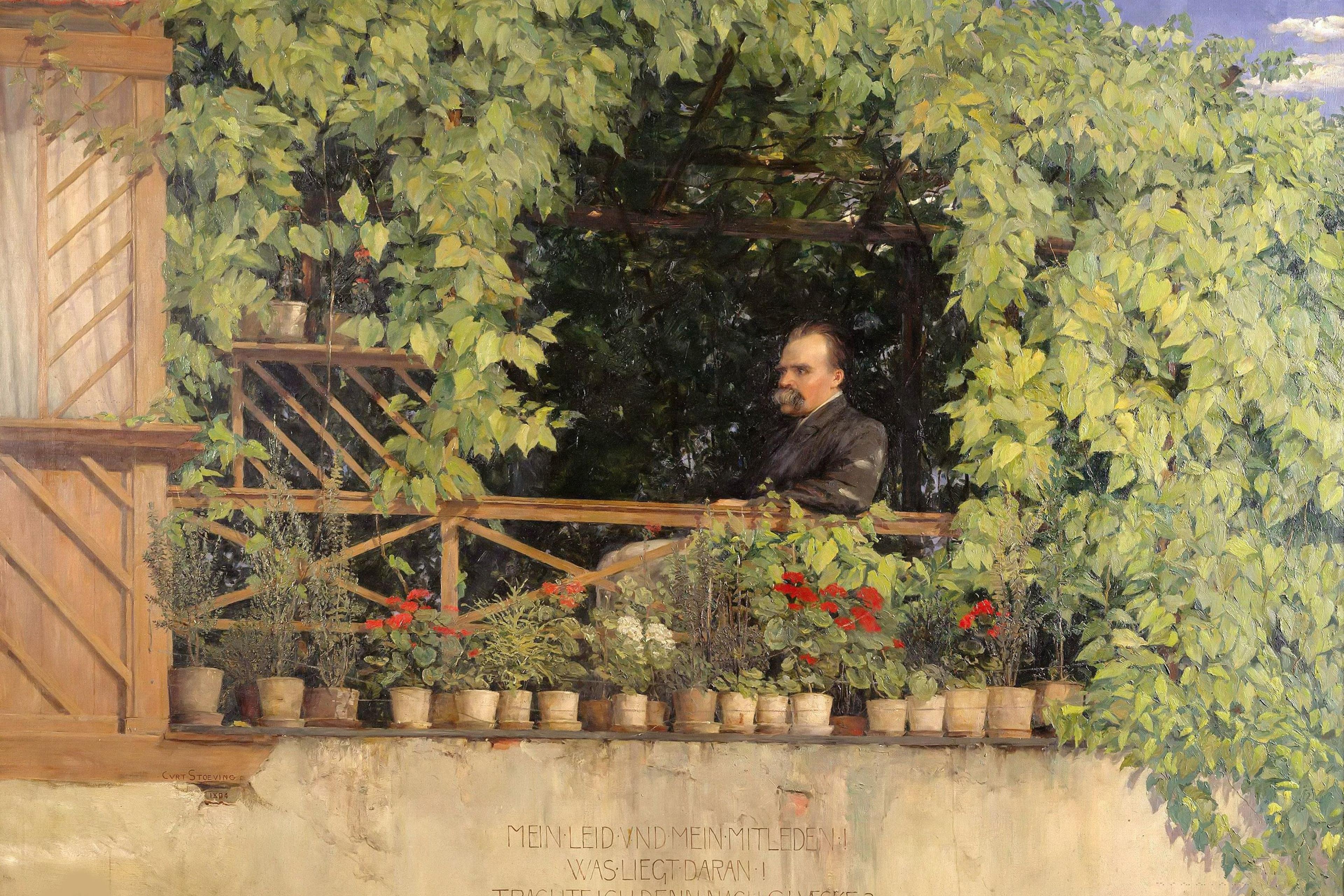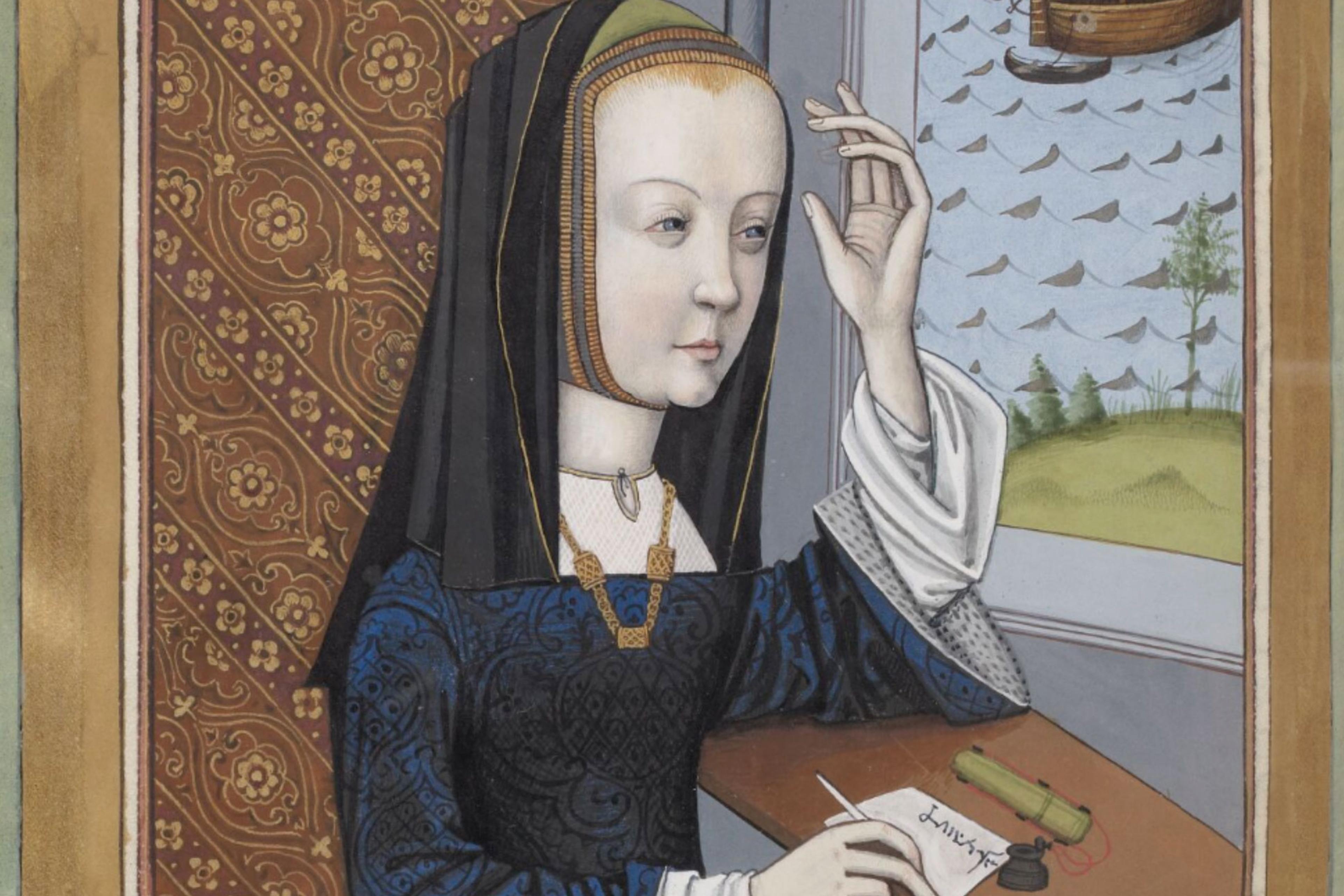In 1882, Friedrich Nietzsche published The Gay Science, a work he referred to as ‘the most personal of all my books’. It came after a series of setbacks in his life, including the weak reception of his previous work, a soured friendship, and his declining health, which caused severe migraines and vomiting, forcing him to resign from his professorial position. Yet it strikes a surprisingly cheerful tone.
It’s in this book that the philosopher first penned the phrase ‘become who you are’. Like much of his work, the phrase is cryptic and ambiguous. We are used to hearing that we should discover, find, or be ourselves. But becoming ourselves is a different, seemingly paradoxical proposition. How can I become who I already am? Nietzsche scatters clues for understanding this profound sentiment throughout his work.
One may be wary of taking life advice from a sickly iconoclast famous for assaulting cherished notions of morality and truth. But contrary to popular belief, Nietzsche was not a nihilist set on destroying human values. In fact, the unifying purpose behind his work was to fill the moral vacuum left by the decline of religion. His aversion to the legalistic and guilt-inducing ethical systems of his time stemmed from his fundamental goal of guiding individuals toward psychological health, personal excellence and virtue.
The concept of virtue has a rich philosophical history going back to the ancient Greeks in the West and Confucius in the East. A number of thinkers have converged on the idea that virtue and happiness are deeply intertwined, and Nietzsche was no exception. However, his version of virtue ethics was distinctive in its view that the cultivation of character was an individualistic enterprise, with each person’s path to virtue as unique as their fingerprint. In his allegorical work Thus Spoke Zarathustra (1883-85), he says: ‘My brother, when you have a virtue, and it is your own virtue, you have it in common with no one.’
Though we may choose to ignore them, Nietzsche thought that our innate strengths and values held the key to our fulfilment. The path toward developing these capacities could be treacherous, and only rare individuals could be expected to overcome the obstacles in their way. But for those who could make it past the perils of conformity and comfort, the highest peaks of flourishing awaited.
So how did he think you should go about developing this personal greatness? The first step was to cultivate self-knowledge. Because we all have self-serving narratives distorting our view, the first step to self-knowledge was to forget everything you think you know about yourself. You must recognise that what you think of as yourself is actually a chaotic multiplicity of drives competing for dominance. You must embrace an active role in shaping the dynamic process of becoming what you are. As the philosopher Paul Franco writes in Nietzsche’s Enlightenment (2011): ‘[W]e must creatively fashion something out of this formless chaos. The self we become is ultimately made, not found.’
Take a philosophical wrecking ball to your beliefs and values, demolishing the cultural baggage that has accumulated in your mind. What remains, according to Nietzsche, will be a unique combination of values and ideals – a map of everything you care about, everything that resonates with you, every ‘yes’ and every ‘no’ to what is admirable in human behaviour. In Beyond Good and Evil (1886), he writes:
At the bottom of us, really ‘deep down’, there is, of course, something unteachable, some granite of spiritual fatum [personal fate or destiny], of predetermined decision in answer to predetermined selected questions. Whenever a cardinal problem is at stake, there speaks an unchangeable ‘this is I.’
Nietzsche thought one of the best ways of identifying these deep impulses of admiration was to seek role models and educators. The people who fill you with reverence and awe serve as the beacons toward the most meaningful path for your development. Identify the virtues of your friends, family, public figures and ancient philosophers to find traces of inspiration. Writing in 2015, the scholar Christine Daigle points out that Nietzsche believed ‘being in the presence of such individuals should entice us to overcome ourselves … should pull us upwards, should serve as that stepladder towards our highest self.’
Nietzsche called for a process of creative experimentation. Fail, learn, and repeat
Mere passive observation, however, wasn’t nearly enough for Nietzsche. He was adamant that self-discovery was only the beginning, and that an individual’s latent capacities must be brought to fruition through action. If you find you have the greatest respect for artists, your path calls for you to cultivate your own creativity and take on the work to embody your artistic ideals. If you most admire entrepreneurs, it’s time to quit your day job.
He called for a process of creative experimentation. Find ways to integrate these admired traits into your life and actions. Fail, learn, and repeat. In the words of one of Nietzsche’s personal role models, Johann Wolfgang von Goethe: ‘How can a man come to know himself? Never by thinking, but by doing.’
In order to evaluate the results of this experimentation, Nietzsche advocated for ‘the enhancement of life as a standard of value.’ How do we feel when we take certain types of behaviours? Are we energised and enlivened? Or do we feel weak and deadened? He advises:
Set up the things that you have honoured in front of you. Maybe they will reveal, in their being and their order, a law which is fundamental of your own self. Compare these objects. Consider how one of them completes and broadens and transcends and explains another: how they form a ladder which all the time you have been climbing to find your true self. For your true self does not lie deeply hidden within you. It is an infinite height above you – at least, above what you commonly take to be yourself.
The reward for those who pursued this path was the highest form of psychological health and satisfaction available to us – a kind of ‘self-satisfaction’ that came from alignment between the ideal and the actual. By coming to know your unique, individual impulses of admiration and pride, you can gradually learn to embody them, until the reality of your character comes to resemble the template of your ideals.
I think it is no coincidence that this notion of self-becoming sounds quite a bit like the humanistic psychologist Abraham Maslow’s concept of self-actualisation. Maslow was deeply influenced by the work of Nietzsche, and they shared many unconventional views. Both thinkers argued that, in much the same way that an acorn has within its nature the oak tree which it will become, the individual has within her a template for self-becoming. Maslow was focused not only on helping individuals achieve unusual levels of wellbeing but also to become, more and more fully, who they were.
Maslow echoes Nietzsche’s sentiments of self-becoming, claiming that the gradual embodiment of one’s values was the fundamental task of psychological health. And to betray or ignore those inner ideals was to plant the seeds of pathology in our minds. Maslow even went so far as to outline a series of ‘metapathologies’ that could stem from the neglect of our highest ideals. As he wrote in 1965:
We already have a start, we already have capacities, talents, directions, missions, callings, and then the job is, if we are to take this model seriously, to help them to be more perfectly what they already are, to be more full, more actualising, more realising in fact what they are in potentiality.
The Renaissance sculptor Michelangelo was known for claiming that he deserved little credit for his beautiful works: they were already there inside the rock, he merely cut them out. ‘Every block of stone,’ he said, ‘has a statue inside it and it is the task of the sculptor to discover it. I saw the angel in the marble and carved until I set him free.’
Becoming who you are is the act of carving your ideal self out of the hard stone of your psyche
The final product already existed within Michelangelo’s ideals. But it took years of trial and error, practice, and failure to reach the point of being able to give form to it. In a similar sense, Nietzsche would say the ‘you’ that you must become is already there. It’s already inscribed in your values. That which you admire – the preponderance of all your latent virtues – reflects who you are in the truest sense.
The act of becoming who you are is the act of carving your ideal self out of the hard stone of your psyche – of bringing greater and greater refinement to the crude shapes of character that exist in you now. Simultaneously an act of discovery and creation, to become who you are is to bring your virtues to life and synthesise them into a unified whole. Nietzsche proclaims:
It is a myth to believe that we will find our authentic self after we have left behind or forgotten one thing or another … To make ourselves, to shape a form from various elements – that is the task! The task of a sculptor! Of a productive human being!
It can sometimes appear that the ideal life would be a smooth one, complete with stable income and harmonious relationships. But Nietzsche would say that it is greatness of the soul that constitutes the good life, not pleasure, comfort or external success. The development of one’s unique virtues is a process that inevitably involved overcoming the resistance in yourself and in your environment, and learning to be comfortable with discomfort.








